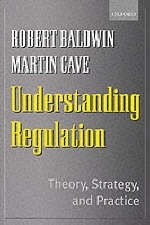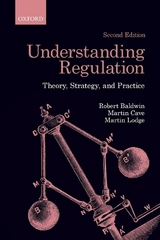
Understanding Regulation
Oxford University Press (Verlag)
978-0-19-877438-9 (ISBN)
- Titel erscheint in neuer Auflage
- Artikel merken
The way in which regulation works is a key concern of industries, consumers, citizens, and governments alike. Understanding Regulation takes the reader through the central issues of regulation and discusses these from a number of disciplinary perspectives. This book is written by a lawyer and an economist, but looks also towards business, political science, sociology, social administration, anthropology, and other disciplines. The fundamental strategies, institutions, and explanations of regulation are reviewed and the means of identifying 'good' regulation are outlined. Individual chapters look at such topics as self-regulation, the regulation of risks, the cost-benefit testing of regulation, the importance of enforcement, and the challenge of regulating within Europe. The book's second part considers a series of issues of particular concern in modern utilities regulation, including the use of RPI-X price caps, the control of service quality, franchising techniques and ways of measuring regulatory performance. Questions of accountability and procedure are then examined and recent public debates on regulatory reform are reviewed.
A central argument of Understanding Regulation is that regulation inevitably gives rise to political contention but that persons of different political persuasion can nevertheless converse sensibly on the search for better regulation.
Robert Baldwin is a Professor of Law at the London School of Economics where he teaches Regulation, Public Law, and Criminal Law. He has previously taught at Edinburgh, Aberdeen, Oxford, and Brunel Universities and has acted as a consultant on regulation to such bodies as the Health and Safety Executive, the Commission of the European Community, the International Labour Organisation, and H. M. Treasury. Martin Cave is Professor of Economics and Vice-Principal at Brunel University. Since 1984, he has conducted a variety of advisory and consultancy work for governments, international organizations and firms such as Monopolies and Mergers Commission, Office of Fair Trading, H. M. Treasury, OECD, and France Telecom.
PART I: INTRODUCTION; 1. Introduction; PART II: FUNDAMENTALS; 2. Why Regulate?; 3. Explaining the Origins and Development of Regulation; 4. How to Regulate: strategies; 5. Who Regulates? Institutions and Structures; 6. What is 'Good' Regulation?; 7. Cost-Benefit Testing Regulation; 8. Enforcing Regulation; 9. Setting Standards; 10. Self-Regulation; 11. Regulating Risks; 12. Regulation in the European Context; 13. Regulatory Competition and Co-ordination; 14. British Utilities Regulation: the basic structure; PART III: PARTICULAR CONCERNS; 15. Price Setting in Natural Monopolies; 16. Regulation versus Competition; 17. Price Capping Mechanisms; 18. Measuring Efficiency: benchmarking and yardsticking; 19. Regulating Quality; 20. Franchising and its Limitations; 21. Accountability; 22. Fairness and Procedures; PART IV: CONCLUSIONS; 23. Conclusions
| Erscheint lt. Verlag | 27.5.1999 |
|---|---|
| Zusatzinfo | figures, tables |
| Verlagsort | Oxford |
| Sprache | englisch |
| Maße | 156 x 234 mm |
| Gewicht | 582 g |
| Themenwelt | Recht / Steuern ► EU / Internationales Recht |
| Sozialwissenschaften ► Politik / Verwaltung | |
| Wirtschaft ► Betriebswirtschaft / Management | |
| ISBN-10 | 0-19-877438-9 / 0198774389 |
| ISBN-13 | 978-0-19-877438-9 / 9780198774389 |
| Zustand | Neuware |
| Haben Sie eine Frage zum Produkt? |
aus dem Bereich



